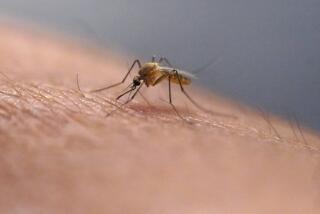Solution: Bite mosquitoes first
- Share via
Old mosquitoes usually spread disease, so Australian researchers devised a natural way to make the pests die younger -- by breeding them to carry an insect parasite that causes earlier death.
The Australian scientists knew that one type of fruit fly often has a strain of bacterial parasite that cuts its life span in half. So they infected Aedes aegypti -- the mosquito species that spreads dengue fever -- with the fruit-fly parasite, breeding several generations in a laboratory.
Voila: Mosquitoes born with the parasite lived only 21 days, compared with 50 days for regular mosquitoes, University of Queensland biologist Scott O’Neill reported Friday in the journal Science.
Once a mosquito encounters a disease like dengue fever or malaria, it takes roughly two weeks of incubation before the insect can spread that pathogen by biting someone. That means older mosquitoes are more dangerous than younger ones.
If the parasite could spread widely enough among wild mosquitoes, it “may provide an inexpensive approach to dengue control,” O’Neill said.
The parasite bacterium, Wolbachia, is common among most arthropods -- just not the specific mosquitoes that spread dengue and malaria, the researchers said. And Wolbachia strains are inherited only through infected mothers, with an evolutionary quirk that can help them quickly gain a foothold in a new population.
O’Neill’s team is preparing for longer studies in special mosquito facilities that better mimic natural conditions to see how well the strain persists as more mosquitoes are born, and what happens when they’re exposed to dengue.






